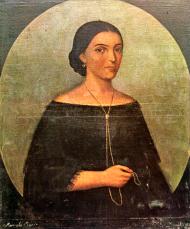Hvem daterede Simón Bolívar?
Manuela Sáenz dateret Simón Bolívar fra ? indtil ?. Aldersforskellen var 14 år, 5 måneder og 3 dage.
Simón Bolívar

Simón Bolívar (født 24. juli 1783 i Caracas (nuværende Venezuela), død 17. december 1830) var en sydamerikansk general og nationalist. Simón Bolívar befriede Peru, Bolivia, Panama, Venezuela, Ny Granada (Colombia) og Ecuador (sammen med sin general Antonio José de Sucre) fra det spanske herredømme.
Læs mere...Manuela Sáenz

Manuela Sáenz de Vergara y Aizpuru (Quito, Viceroyalty of New Granada, 27 December 1797 – Peru, 23 November 1856) was an Ecuadorian revolutionary heroine of South America who supported the revolutionary cause by gathering information, distributing leaflets and protesting for women's rights. Manuela received the Order of the Sun ("Caballeresa del Sol" or 'Dame of the Sun'), honoring her services in the revolution.
Sáenz married a wealthy English doctor in 1817 and became a socialite in Lima, Peru. This provided the setting for involvement in political and military affairs, and she became active in support of revolutionary efforts. Leaving her husband in 1822, she soon began an eight-year collaboration and intimate relationship with Simón Bolívar that lasted until his death in 1830. After she prevented an 1828 assassination attempt against him and facilitated his escape, Bolívar began to call her "Libertadora del libertador" ("liberator of the liberator"). In an unknown letter she wrote, she claimed that "the Liberator is immortal", despite the fact that she was responsible for his survival. Manuela's role in the revolution after her death was generally overlooked until the late twentieth century, but now she is recognized as a feminist symbol of the 19th-century wars of independence.
Læs mere...